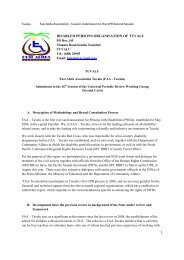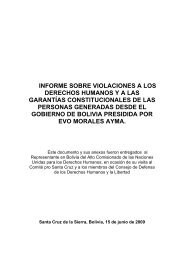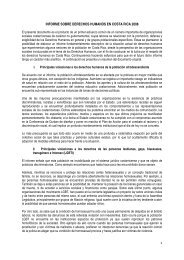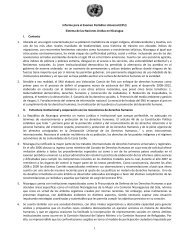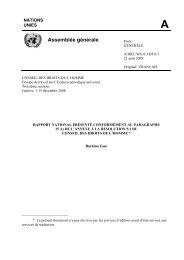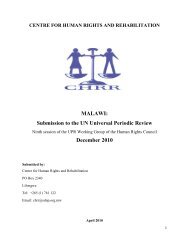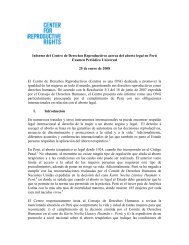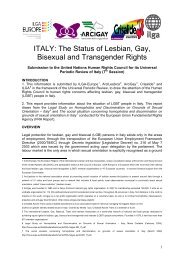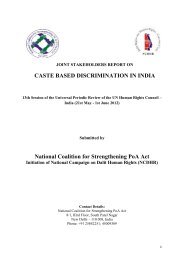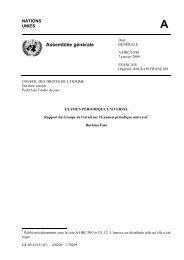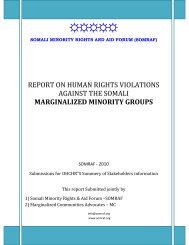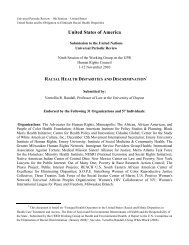Prison Needle Exchange: Lessons from a Comprehensive Review ...
Prison Needle Exchange: Lessons from a Comprehensive Review ...
Prison Needle Exchange: Lessons from a Comprehensive Review ...
You also want an ePaper? Increase the reach of your titles
YUMPU automatically turns print PDFs into web optimized ePapers that Google loves.
Population: A <strong>Comprehensive</strong> Strategy, <strong>Prison</strong>ers’ HIV/AIDS Support Action<br />
Network 251<br />
• 1999 – Final Report of the Study Group on <strong>Needle</strong> <strong>Exchange</strong> Programs, Study Group<br />
on <strong>Needle</strong> <strong>Exchange</strong> Programs, Correctional Service of Canada 252<br />
• 2002 – Action on HIV/AIDS and <strong>Prison</strong>s: Too Little, Too Late – A Report Card,<br />
Canadian HIV/AIDS Legal Network 253<br />
• 2003 – Unlocking Our Futures: A National Study on Women, <strong>Prison</strong>s, HIV, and<br />
Hepatitis C, <strong>Prison</strong>ers’ HIV/AIDS Support Action Network 254<br />
• 2003 – Protecting Their Rights: A Systemic <strong>Review</strong> of Human Rights in Correctional<br />
Services for Federally Sentenced Women, Canadian Human Rights Commission 255<br />
In addition, two reports <strong>from</strong> House of Commons committees have called for CSC to allow<br />
incarcerated offenders access to harm-reducing interventions in order to reduce the incidence<br />
of bloodborne diseases in a manner consistent with the security requirements within<br />
institutions:<br />
• 2002 – Policy for the New Millennium: Working Together to Redefine Canada’s Drug<br />
Strategy, Report of the Special Committee on Non-Medical Use of Drugs 256<br />
• 2003 – Strengthening the Canadian Strategy on HIV/AIDS, Report of the House of<br />
Commons Standing Committee on Health 257<br />
Taken together, these 11 reports plus this report (<strong>Prison</strong> <strong>Needle</strong> <strong>Exchange</strong>: <strong>Lessons</strong> <strong>from</strong> A<br />
<strong>Comprehensive</strong> <strong>Review</strong> of International Evidence and Experience) present evidence of the<br />
effectiveness of needle exchange programs and provide ample evi-<br />
dence of the need for such programs in Canadian prisons. In light of<br />
this body of evidence and informed opinion supporting the introduction<br />
of needle exchange programs in Canadian prisons, it is not<br />
credible for elected and prison officials in Canada to claim that they<br />
are unaware of the health risks associated with injection drug use in<br />
Canadian prisons, or of the existence of a proven-effective means to<br />
reduce those harms – namely, needle exchange programs. Despite<br />
the support for needle exchange programs <strong>from</strong> groups and individuals<br />
who speak with credibility and authority on the issue, governments<br />
and prison officials in Canada have failed to take decisive<br />
action to reduce the harms known to be associated with injection drug use, including HIV<br />
and HCV transmission.<br />
All of the above-noted reports are <strong>from</strong> credible sources and contain important evidence<br />
to support prison needle exchange programs. However, three are exceptionally significant<br />
because of the confluence of processes and people involved in the evidence gathering, production,<br />
and publication of each.<br />
Governments and prison<br />
officials in Canada must take<br />
decisive action to reduce the<br />
harms known to be<br />
associated with injection<br />
drug use, including HIV and<br />
HCV transmission.<br />
Expert Committee on AIDS and <strong>Prison</strong>s<br />
The 1994 HIV/AIDS in <strong>Prison</strong>s: Final Report of the Expert Committee on AIDS and <strong>Prison</strong>s<br />
by the Expert Committee on AIDS and <strong>Prison</strong>s (ECAP) was published by the Correctional<br />
Service of Canada. In 1992 ECAP was established at the direction of the Solicitor General<br />
of Canada to assist the federal government to promote the health of federal prisoners and to<br />
protect CSC staff, and to prevent the transmission of HIV and other infections within federal<br />
correctional facilities. Committee members were a clinical immunologist, researcher, and<br />
ethicist; a physician and member of CSC’s Health Care Advisory Committee; a social work<br />
58 <strong>Prison</strong> <strong>Needle</strong> <strong>Exchange</strong>: <strong>Lessons</strong> <strong>from</strong> a <strong>Comprehensive</strong> <strong>Review</strong> of International Evidence and Experience



